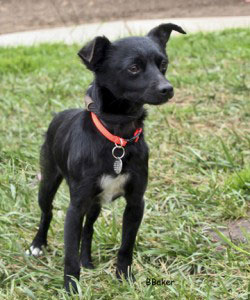Do Pets Grieve?
When the Pack Loses a Member
A few months ago, my cat Sola passed away. My husband was through his grief almost immediately, rationalizing that our 17-year-old kitty had lived a long, happy life. My 2-year-old son asked about Sola a few times, and after many explanations of the fact that Sola had died, as well as reading Cat Heaven several times, he, too, was over his loss. Considering that I lived with Sola his entire 17 years, I am taking longer to get over my grief. But one member of the family that seems to be suffering the most is my 4-year-old cat Sushi.

Losing a pet is almost always hard for the pet owner, but it can be equally hard on other pets in the household. Experts say that dogs especially feel the loss of a fellow canine due to their pack mentality. A study from the American Society for the Prevention of Cruelty to Animals (ASPCA) found that two-thirds of dogs show recognizable signs of grieving, such as decrease in appetite, clinginess, and lethargy.
Last year, there was an image that instantly went viral — a brown Labrador retriever named Hawkeye lying beside the American flag-draped casket of his human companion, Navy SEAL Jon Tumilson. Hawkeye walked up to the casket at the beginning of the service and then dropped down with a heaving sigh as about 1,500 mourners witnessed a dog accompanying his master until the end. It was a truly heartbreaking image that showed the capacity for pets to grieve. Dr. Christopher Pachel, a board-certified veterinary behaviorist says, “When an extremely socially bonded dog loses a member of the family, whether it’s another dog in the household or a human companion, the physical signs of depression can show up at greater heights and lengths. This may lead to a loss in appetite, lowered water intake, sluggish response to humans and other pets, a loss of interest in play or physical activity, and even a mournful howl here and there. The symptoms can also increase gradually over weeks or months. If you’ve noticed these symptoms in your pet, it’s best to get the dog to a vet as soon as possible to rule out any potential physical illness.”
If you have recently lost a pet and your current pet seems to be grieving, help her recover by spending extra time together. If you have a dog, take longer walks together or try to spend a few extra minutes throwing a ball around at the park. If your dog seems interested in other dogs while at the park, think about scheduling doggy play dates. But if your dog doesn’t take an interest in other dogs, be sure to respect her need to be alone.
If you have a cat who is suffering from grief, try to spend more one-on-one time with pole toys or other interactive games. Another idea to help your cat get over his grief is to groom him more. I found that grooming was one of the things that my cat Sushi stopped doing after Sola died. I set aside time to brush him every night, even if it was just for a few minutes.
Some pets suffer from grief with such extreme that they stop eating. If this is the case for your pet, it’s best not to try to coax her with human comfort food. Instead, try to encourage her appetite by minimizing extra stress and offering a few extra dog or cat treats. If her appetite doesn’t increase within a few days, you should consult your veterinarian.
Although it may be tempting to run out and adopt another dog or cat after your pet passes away, most experts recommend waiting at least three months to give your pet time to adjust. Adopting a new puppy or kitten may not be the best idea since a hyperactive animal can be physically and emotionally stressful on your grieving pet. Even an older, mellower cat or dog may cause your pet to become territorial. Be sure your pet is fully over his grief before you bring a new pet into your home.
Animal experts say that while pets may take many weeks or months to get over the loss of an animal companion, almost all pet owners eventually notice a return to normal activity. If your pet is taking longer then six months to get over a loss, you should take your pet to the veterinarian to rule out other medical problems. I’m hoping my cat Sushi will get over his grief relatively soon. My husband and I are able to understand and be patient with our cat’s withdrawn behavior and need to be alone. Our 2-year-old, on the other hand, continues his futile attempts at running after him to play.
Announcements
Fourth Annual K-9 PALS Dog Festival and Great Ball Drop
The event will be held Saturday, September 29, 11 a,m.-3 p.m., at Chase Palm Park. This is a great family and dog-friendly event, which benefits the homeless and abandoned dogs of Santa Barbara County. You’ll want to bring the kids — and your dogs — and enjoy the fun. All proceeds will go to support the K-9 PALS Medical Fund for the homeless and abandoned dogs of Santa Barbara County.
This year’s festival includes dog agility exhibitions, dog behavior demonstrations, K9 police dogs, lots of wonderful dogs for adoption from local rescue groups and shelters, exhibits by local businesses and organizations with information about people, pet and eco-friendly products and services, live music and great food.
Highlighting the day of festivities is the Great Ball Drop. At approximately 2 p.m., the Santa Barbara Fire Department will hoist 1,000 tennis balls up into the air and drop them over the specially designed prize board. This year’s Great Ball Drop Grand Prize is worth more than $750, and 30 other prizes are all worth more than $150 and all are donated from local businesses. Raffle tickets will be available for purchase prior to the event: one ticket for $10 or 10 tickets for $90. Contact info@k-9pals.org for more information.
K-9 PALS is the all-volunteer nonprofit organization that provides medical care, support, food, medications, dog behavior training, foster homes, adoption promotions, and advocacy for the dogs of Santa Barbara County Shelters, with the goal for every adoptable dog to have a chance for a loving home.
For more information about the 4th Annual K-9 PALS Dog Festival and Great Ball Drop, and about K-9 PALS, contact info@k-9pals.org or (805) 570-0415.
Adoptable Pet of the Week
Horchata is a small-sized, 2-year-old male Chihuahua mix. He is slim and trim and has a lovely coat of shiny black hair with white markings. He has a thick tail and soft floppy ears. Horchata is not a barker. He is a very sweet, super friendly little guy that loves to sit in your lap and give kisses. He is good with other dogs and cats. He is calm and happy and would be a wonderful companion for someone looking for a sweet, loyal little buddy. Horchata appears to be potty trained.

To inquire about adopting a dog, visit DAWG in Santa Barbara. DAWG (Dog Adoption and Welfare Group) is a no-kill not for profit dog rescue/adoption organization located at 5480 Overpass Road in Goleta. For more information, call (805) 681-0561. You can view more adoptable dogs at www.sbdawg.org. All of the dogs have been spayed/neutered, micro-chipped, are current on their shots, and have flea/tick/mosquito protection. We ask for a minimum adoption donation of $250 for young dogs (under three years), $150 for adult dogs, and $125 for seniors (dogs 8 years old and over).
For more information on our available dogs, call (805) 681-0561, email: adopt@sbdawg.org, or come by during open adoption hours, 12 p.m.-5 p.m., Thursday through Monday.



